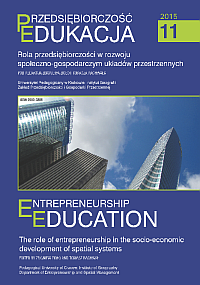Planning a professional career in the educational process in France
DOI:
https://doi.org/10.24917/20833296.11.29Keywords:
career counseling, education, France, schools, teaching programAbstract
The aim of this study is to provide insight into the experiences of the French education system in preparing students for making career choices. The text focuses on the key steps taken when students enter secondary school (école secondaire) at the junior level of high school (college). This is when young people have the opportunity to choose which path of education they will follow next. Vocational guidance and planning in France has a very rich tradition, dating back to the beginning of the 20th century. However, it was only the Education Act of July 1989 that placed schools under an obligation to provide information as well as educational and career guidance. Then, the Act of April 2005 on vocational guidance made it compulsory for each school to develop its own educational project on vocational guidance. The project aims to involve not only the school and teachers, but also the students’ parents, career advisors, known as conseiller d’orientation, as well as professionals, with the assistance of the local authorities, trade organisations, companies and associations. Other organisations, whose role is to assist in the selection of a vocational career are the National Employment Agency (Pôle Emploi), the Centre of Information for Youth - CIDJ (Centre d’Information et de Documentation Jeunesse), the National Office for Education and Career Information - ONISEP (Office National d’Information sur les Enseignements et les Professions), and the Centre for Studies and Research on Qualifications - CEREQ (Centre d’Etudes et de Recherches sur les Qualifications). All students at junior and senior secondary level participate in an educational program called the “Pathway to the discovery of educational and vocational options”, which aims to set forth a fairly comprehensive range of available professions and educational alternatives. At the junior secondary level, the above-mentioned pathway is one way of gaining knowledge and skills common to all types of professional activity, i.e. social and citizenship skills, as well as qualities such as independence and initiative. At the senior level, the “Pathway to the discovery of educational and vocational options” is continued and adjusted to comply with the objectives of the reform of senior secondary schools, implemented in 2010. All students of the “new senior secondary” school are to have new tools at their disposal: two hours per week of personalised assistance (accompagnement personalisé), mentoring and opportunities to review their current career path. The introduction, in 2005, of a new option called “discovering occupations” - DP3 - to the curriculum of the final year of collège was a response to the increasingly obvious maladjustment of young people to the realities of the job market, stemming from a lack of proper guidance prior to taking such an important step on the road to independence and self-fulfillment. It must be said that, although French educational authorities were slow to note the existence of system faults at the school/work level of co-operation, they took quite far-reaching and comprehensive measures to rectify the situation. It is still too early to pass judgement on the effectiveness of the 2005 reform, however, the introduction of diverse actions and initiatives geared towards increasing economic awareness among young people and improved guidance enabling them to take up employment, are commendable and a worthy example for other nations.References
Borowiec, M. (2009). Rola edukacji w kształtowaniu społeczeństwa informacyjnego. Przedsiębiorczość – Edukacja, 5, 37-47.
Czerepaniak-Walczak, M. (2001). Doradztwo w reformowanej szkole-gimnazjum jako ośrodek doradztwa. W: B. Wojtasik (red.), Podejmowanie decyzji zawodowych przez młodzież i osoby dorosłe w nowej rzeczywistości społeczno-politycznej. Wrocław: Instytut Pedagogiki Uniwersytetu Wrocławskiego, 345-360.
Diagnozowanie zapotrzebowania na kwalifikacje i umiejętności na lokalnych i regionalnych rynkach pracy. Ministerstwo Pracy i Polityki Społecznej. (2009). Warszawa.
Dorocki, S., Brzegowy, P. (2014a). Miejsce przedsiębiorczości w systemie edukacyjnym Francji i jej wpływ na aktywizację gospodarczą regionów. O idei l’esprit d’entreprise. Horyzonty wychowania, 13(26), 287-302.
Dorocki, S., Brzegowy, P. (2014b). Uwarunkowania przestrzennego zróżnicowania postaw przedsiębiorczych we Francji. Przedsiębiorczość - Edukacja, 10, 148-163.
Dument, L. (2009). Le travail raconté aux ados. Liaisons sociales magazine, Novembre.
Dziewulak, D. (2013). Doradztwo edukacyjno-zawodowe w szkolnictwie zawodowym w Polsce i w wybranych państwach Unii Europejskiej. Analizy, 4(93), 1-8.
Kilar, W., Kurek, S., Rachwał, T. (2013). Kształtowanie kompetencji osobistych i społecznych w szkolnictwie zawodowym dla sektora handlu detalicznego w świetle opinii partnerów społecznych. Przedsiębiorczość – Edukacja, 9, 273-288.
Kurek, S., Rachwał, T. (2011). Development of entrepreneurship in ageing populations of the European Union. Procedia. Social and Behavioral Science, 19, 397-405.
Kurek, S., Rachwał, T. (2010). The Role of Business Education in the Development of Entrepreneurship in the Member States of the European Union. Europa XXI, 19, Warszawa: PAN, 127-142.
Kurek, S., Rachwał, T., Szubert, M. (2012). Kształtowanie kompetencji biznesowych uczniów gimnazjum w świetle opinii nauczycieli na podstawie wyników badań prowadzonych w ramach europejskiego projektu FIFOBI. Przedsiębiorczość – Edukacja, 8, 24-36.
Naudé, W. (2008). Entrepreneurship in Economic Development. Research Paper 20. World Institute for Development Economics Research, 1-47.
Oleksiuk, A. (2013). Fenomen przedsiębiorczości akademickiej: mit czy rzeczywistość w perspektywie przyspieszenia rozwoju regionalnego w Europie?. Kwartalnik Naukowy Uczelni Vistula, 1(35), 73-92.
Piróg, D. (2005). Miejsce i rola edukacji europejskiej w nauczaniu podstaw przedsiębiorczości w kontekście współczesnych wyzwań cywilizacyjnych. Przedsiębiorczość – Edukacja, 1, 213-220.
Pointeau, B. (2008). L’Entreprise expliquée aux ados. Paris: Nathan.
Skup, M., Litwinowicz, A. (2011). Innowacyjne metody modernizacji oferty edukacyjnej na podstawie francuskich dobrych praktyk. Białystok: AR ADMIS.
Tadeusiewicz, G. (1997). Edukacja w Europie: szkoła, nauczyciel, doradztwo zawodowe. Łódź: PWN.
Wach, K. (2007). Kształtowanie postaw przedsiębiorczych w programach nauczania. Stan obecny i proponowane kierunki zmian. W: P. Wachowiak, M. Dąbrowski, B. Majewski (red.), Kształtowanie postaw przedsiębiorczych a edukacja ekonomiczna. Warszawa: Fundacja Promocji i Akredytacji Kierunków Ekonomicznych, 120-127.
Zioło, Z. (2012). Miejsce przedsiębiorczości w edukacji. Przedsiębiorczość – Edukacja, 8, 10-23.
Downloads
Published
How to Cite
Issue
Section
License
Articles are published under the terms of the Creative Commons License (CC BY-ND 4.0; Attribution– NoDerivs).

